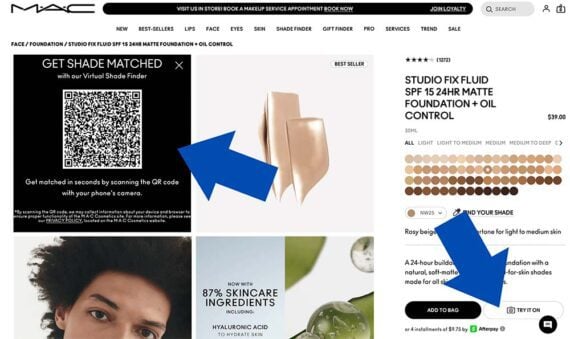The decision of the last week in Australia causes the use of face recognition to combat fraud almost impossible and is the latest example of increasing disagreement with biometric technology of global regulatory bodies in retail ships.
The Australian Commissioner for Information Information (OAIC) has determined that KMART Australia Limited has considered the Personal Data Protection Act in 1988, using facial recognition to prevent fraud in return and theft.
Kmart shops in Australia used facial recognition technology to catch fraudsters. Figure: Wesfarmers.
KMART AND BUNNINGS
The question was the pilot program KMART, which placed the technology of face recognition (FRT) in 28 retail rentals of the company since June 2020 since July 2022.
The company has created a facial press if you want, each shopper entering one of the pilot programs stores. When the customer returned the item, the KMART system would compare the face of this person with the list of Chewers and fraudsters.
Kmart claimed that technology loved the thwarting of return fraud and protect his employed, which thieves often threatened. Biometry, however, replaces a special category of privacy protection in Australia.
The case was similar to November 2024 OAIC decision against Bunnings, a retailer with a domestic improvement, for its use to identify criminals. The Australian conglomerate Wesfarmers Limited is owned by KMART Australia, Bunnings and other retail chains, including Australia Target.
FRT challenges
OAIC said he was finding No Prohibition of FR, but its manufacturers of conditions using technology demanding, not if impossible.
For example, Australian retaliation would need consent before the employment of FRT and thieves stole objects to try to return the fraud almost certainly to reject.
Kmart has published FRT in the front of each pilot store, which reads: “This trade has a 24 -hour CCTV coverage that includes facial recognition technology.” However, this notice did not show the agreement with OAIC.
Asking for future criminals for permission to use face recognition has the same effect as its ban, due to the current state of technology.
GDPR
The OAIC KMART decision explicitly agrees with other regulations and decisions on personal data protection.
For example, many personal data protection experts note that Article 9 of the General Data Protection Regulation, which includes the processing of special categories of personal data, requires an expicile constant for the use of FRT.
FTC vs. Rite Aid
In the United States, there are cases of decisions against FRT and the use of biometric data.
In determining 2023, the US Federal Commerce forbade the Rite Aid pharmacy and another automated biometric system for five years.
The agency argued that Aid Rite Aid has not taken sufficient measures to prevent false and algorithmic racial profile.
Illinois bipa
The Illinois Personal Data Protection Act was adopted in 2008 and is perhaps the strictest Biometric Personal Data Protection Act.
BIPA requires businesses to provide written notifications of using biometric data and obtain written consent of shoppers. The law allows individuals to sweat for violations and results in Mary Hosses against retailers such as:
- Judicial action 2022 claims that Walmart’s in the “Cameras and Advanced Video Supervision Systems” store secretly collect biometric data of shoppers without prior warnings.
- The court action for class 2024 against Target Alges used retail to identify shoplifters without proper consent.
- A court lawsuit filed in August 2025 claims that Home Depot illegally uses his self -self -self -made kiosky.
M • a • c cosmetics
From the point of view of retail and electronic trading may be the most concerning court proceedings Fiza Javid v. Mac Cosmetics Inc. The following event follows, filed in August 2025, does not deal with the struggle for crimes, but about Try-On virtual technology.
The complaint notes that web m • a • c asks the shoppers to pour a photo or allow a live video to detect someone’s face structure and skin color. The plaintiff Fiza Javid requires this function to be written by BIPA and therefore violates the Illinois Act.

M • A • C Cosmetics offers tools to identify virtual market-on and skin color.
M • A • C virtual makeup Try-up tools increase the shoppers’ experience and almost certainly improve the level of electronic trading conversions.
The benefits of the case are waiting, but the BIPA has already created virtual test cases, including:
- Kukovec v. Estée Lauder Companies, Inc. (2022).
- Theriot v. Louis Vuitton North America, Inc. (2022).
- Gielow v. Pandora Jewelry LLC (2022).
- Shores v. Wella Operations US LLC (2022).
Commitment and entertainment
Face recognition and biometric technology powered and are among the most promising trends in retail and electronic trading.
This technology has the potential to reduce fraud, discourage theft and promote prosecution. Article 2023 in the International Security Journal estimated that facial biometrics could sell theft of 50% and 90% depending on location and use.
In addition, biometrics can improve online and in a virtual test store for testing. Some traders reported a 35% increase in sales conversions when virtual shopping is available.
The question is how the regulations and the decision to protect personal data, such as the decision of KMART last week, ultimately affect its use.

